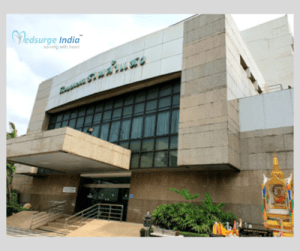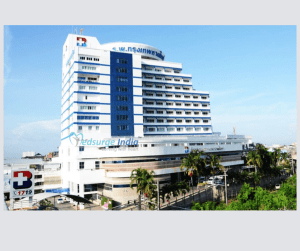Knee Replacement Surgery Cost In Thailand
Unlock Exclusive Discount : Your Gateway to Premium Healthcare with Medsurge India Health Value Card.

Unlock Exclusive Discount : Your Gateway to Premium Healthcare with Medsurge India Health Value Card.


“Knee arthroplasty’, or “knee replacement surgery”, is a process for treating severely injured knee joints that relieves pain and restores function. Your thighbone, shinbone, and kneecap are removed during therapy, and the damaged bone and cartilage are replaced with a prosthesis, an artificial joint comprised of metal alloys, high-quality plastics, and polymers. The orthopedic surgeon places metal or plastic components or a prosthetic device in the ends of the bones that make up the knee joint. The knee may now move normally as a result. Knee replacement surgery in Thailand may be beneficial for patients with osteoarthritis, rheumatoid arthritis, or post-traumatic arthritis, which develops after a knee injury. If the patient adheres to the surgeon’s knee maintenance recommendations, 90% of replacement knees continue to operate effectively after 15 years, and 80 to 85% of replacements last 20 years.
The achievement is primarily attributable to Thailand’s hospitals’ cutting-edge medical technology and the skill of their knee surgeons. Aside from these benefits, another significant factor in Thailand’s appeal around the world is its cost of knee replacement surgery without sacrificing professional standards.
Through knee replacement surgery, a worn-out, diseased, or injured knee joint can regain its ability to support the weight. Pain relief and movement restoration are the goals. During treatment, your thighbone, shinbone, and kneecap are removed, and the damaged bone and cartilage are replaced with a prosthetic joint.
Here are some common reasons why people have knee replacement surgery:
The Average Knee replacement surgery cost in Thailand starts from 3,83,000 THB ($10,500). In comparison to other countries, the cost of Knee Replacement surgery in Thailand is very low. Furthermore, the quality and standard of medical care and services are comparable to the best hospitals in the world with even accounting for the expenses for travel, accommodation, and food are factored in and is the main reason why thousands of patients go to Thailand for medical treatment.
The cost of a medical package in Thailand may vary depending on several factors such as the type of treatment, the technique used, the choice of hospital and city, the doctor’s experience, and many more. This is the primary reason why thousands of patients from all over the world choose to travel to Thailand for medical treatment.
Thailand, a growing country with a population of around 67 million, is situated in South East Asia’s Indochina Peninsula and is known for its tropical beaches, opulent royal palaces, historic ruins, and stunning Buddha temples. More than 25 million tourists visit Thailand each year, making it a huge economic force in the nation. Due to its pristine beaches, tropical climate, and cheap currency, Thailand draws a lot of travelers looking to extend their vacations compared to what the same amount of money can buy in other locations. Thailand is a popular destination for patients seeking the best knee replacement surgery. Thailand is a significant hub for state-of-the-art healthcare solutions, excellent medical treatment, and affordable care. They employ doctors and other medical specialists with extensive experience. One of Thailand’s top hospitals, Best Thailand Hospitals, offers patients care that satisfies worldwide standards. The medical diagnostic, therapeutic, and preventive services provided in Thailand are comparable to those provided by the world’s top hospitals. The most modern facilities support the most modern services offered by Thailand’s best hospitals.
The hospitals provide both inpatient and outpatient care in addition to a range of lodging options, including lavish suites and shared beds for large groups. Additionally, they feature state-of-the-art labs, a modular approach to occupational therapy, and well-stocked critical care and rehabilitation facilities. In cancer hospitals, you can find blood banks, emergency medical services, ambulance services, campus-wide Wi-Fi, multi-cuisine cafeterias, and prayer spaces. You can also find digital diagnostic laboratories and imaging centers. Numerous facilities also offer specialized services for overseas patients, including lodging arrangements, aid with visas, airport transfer, and interpreters for other languages.
Read More – Orthopedic Surgery Cost in Thailand
There are two types of replacement surgeries: partial knee replacement and total knee replacement, the latter of which is more frequently carried out.
Types of knee replacement approach: A qualified orthopedic surgeon will map out the anatomy of your knee beforehand to guarantee a smooth treatment, allowing them to plan their surgical approach and prepare for any special instruments or devices. This is a crucial step in the procedure. Below are some potential processes considered.
Thailand's knee Replacement Surgery Treatment Hospitals are well known for their hospitality and patient care services. The best orthopedics in Thailand at these hospitals are specialists in their fields. However, choosing a suitable hospital for treatment can be difficult for an international patient. It is a significant decision that must be made with several factors in mind, including:
Helpful - Tanzanian Patient Testimonial – Knee Correction Surgery
Medsurge India is a prestigious support system for patients looking for doctors, hospitals, and specialized treatments. We'll find the most suitable medical options for you. Regarding your medical issues, our team will give you a list of certified, reputable, and trusted doctors and hospitals. Additionally, we offer a treatment strategy that fits your budget. Apart, we assist patients with obtaining travel authorizations, medical visas, and a multitude of other things.
A: Most patients are able to resume most normal activities and walk without the use of assistive devices three to six weeks after surgery, assuming no complications. Overall, recovery from a minimally invasive knee replacement usually takes two to three months.
A: The most common age group for knee replacement patients is between the ages of 50 and 70. Patients over the age of 70 may also benefit greatly from the mobility and comfort that a prosthesis provides.
A: Knee arthritis causes the knee to become looser and more unstable. This is mild in some cases. In other cases, it is significant enough that the patient falls. Patients with bone-on-bone arthritis who are starting to fall should strongly consider surgery.
A: Researchers advise against using cortisone to treat knee osteoarthritis. Although surgery and cortisone injections are common, randomized trials have failed to produce evidence for their effectiveness or how much they do work. Cortisol can exacerbate bone-on-bone by thinning the meniscus.
A: Knee Stiffening A stiff knee joint is one of the most common side effects of knee replacement. These symptoms can frequently make normal activities difficult, such as going down stairs, sitting in a chair, or getting out of a car.

Spine Surgeon
Consultant
24+ Years of Experience
Bangkok Hospital
View Doctor










By using our site, you agree to our Terms and Conditions, Privacy Policy and Refund Policy. Medsurge India provides reliable healthcare information and treatment options to support informed decision-making. Our content is designed to support and complement the guidance of your treating doctor, helping you feel informed and confident throughout your healthcare journey. We also Accept International Payments.

Copyright © 2025 NSM ONLINE SOLUTIONS PRIVATE LIMITED. All rights reserved.